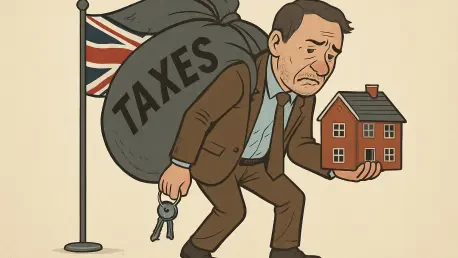In a striking development that could reshape the UK rental market, the government has proposed a new policy to impose National Insurance (NI) contributions on landlords’ rental income profits, aiming to raise an estimated £2 billion for the Treasury. This move has sparked intense debate among industry stakeholders who warn of severe repercussions for both property owners and tenants. The plan comes at a time when the buy-to-let sector is already grappling with mounting financial pressures, from reduced mortgage interest relief to stricter regulations. As this controversial tax proposal looms large ahead of the autumn Budget, concerns are mounting that it could exacerbate an already strained housing market. The central issue lies in the potential for this added burden to trigger a domino effect, with landlords possibly passing on costs through higher rents, ultimately impacting the very renters the government seeks to support.
Industry Backlash and Financial Strain
The reaction from the rental property sector has been swift and critical, with many arguing that the proposed National Insurance contributions represent a punitive measure on top of existing taxes like income tax on rental profits. Industry leaders, such as Ben Beadle from the National Residential Landlords Association, have highlighted the cumulative impact of recent fiscal changes, including higher stamp duty on rental properties and rising borrowing costs. Adding NI, which currently applies to earned income and self-employed profits at rates of 8% and 6% respectively above certain thresholds, could push many landlords to their financial limits. There’s a palpable fear that this tax will force some to exit the market entirely, reducing the supply of rental homes at a time when demand continues to surge. With projections from Savills indicating a need for up to one million new rental properties by 2031, this policy could widen the gap between supply and demand, creating a tighter, more expensive market for tenants.
Ripple Effects on Tenants and Housing Affordability
Looking beyond the immediate impact on landlords, the broader consequences of this tax proposal reveal a troubling outlook for renters and the ongoing housing crisis. Critics argue that property owners, already facing significant costs such as energy efficiency upgrades that can reach £15,000 per property, are likely to offset the National Insurance burden by increasing rents. This shift would place additional financial strain on tenants, many of whom are already struggling with affordability in a competitive market. The irony lies in the government’s stated intent to protect renters through policies like the Renters’ Rights Bill, which abolishes ‘no-fault’ evictions, while simultaneously introducing measures that could undermine those efforts. Industry voices have called for a more balanced approach, advocating for tax incentives that encourage investment in quality rental housing and support sustainable improvements rather than deterring participation in the market. As discussions unfolded, it became evident that short-sighted fiscal policies risked deepening the challenges faced by renters, highlighting a critical need for strategies that prioritize long-term stability over immediate revenue gains.









